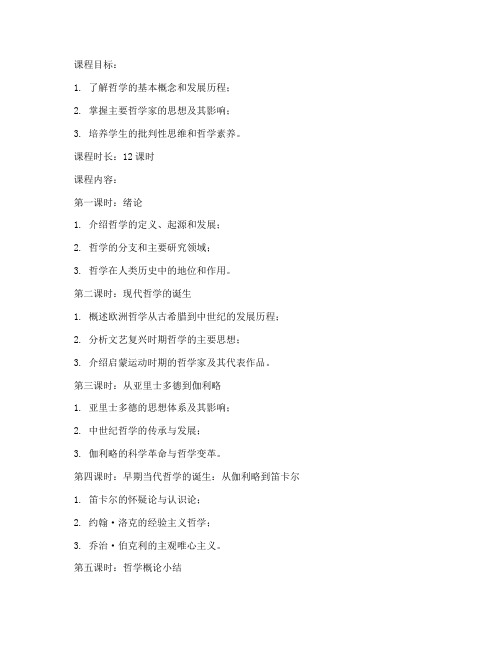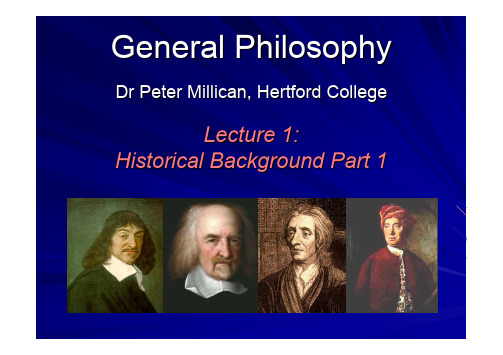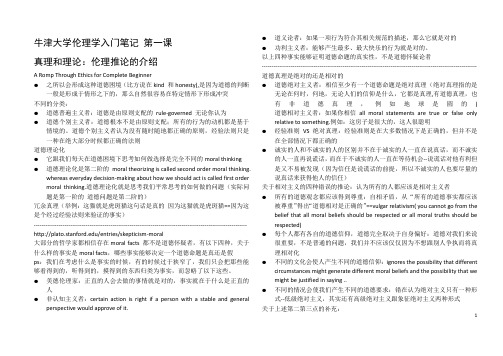牛津大学哲学概论Peter-Millican-Genera-Philosophy-General-M
罗素西方哲学史英文原版

罗素西方哲学史英文原版Bertrand Russell was a prominent British philosopher, logician, mathematician, historian, writer, social critic, political activist, and Nobel laureate. He is considered one of the founders of analytic philosophy and one of the most important logicians of the 20th century. Russell made significant contributions to a wide range of fields, including logic, mathematics, epistemology, metaphysics, ethics, and political theory.Russell's work in logic and mathematics is particularly noteworthy. He is known for his work on the foundations of mathematics, where he developed the theory of types to resolve the paradoxes that arise in set theory. His work on logic, especially his collaboration with Alfred North Whitehead on the Principia Mathematica, laid the groundwork for modern symbolic logic and the development of computer science.In epistemology, Russell was a proponent of a form of empiricism known as logical atomism. He believed that the world consists of simple, indivisible entities called "atoms of experience," and that all complex ideas can be analyzed in terms of these atomic elements. Russell's theory of descriptions, developed in his seminal work "On Denoting," has had a profound influence on the philosophy of language and metaphysics.In metaphysics, Russell was a proponent of neutral monism, the view that reality consists of a single substance that is neither mental nor physical. He rejected both idealism and materialism in favor of a more nuanced account of the nature of reality. Russell's views on metaphysics were influenced by his early work in mathematics and logic, as well as his later interest in the philosophy of mind.Ethically, Russell was a proponent of a form of ethical non-naturalism known as ethical intuitionism. He believed that moral truths are self-evident and can be known through direct intuition, rather than through empirical investigation or rational deduction. Russell's ethical views were informed by his broader philosophical commitments to empiricism and logical analysis.Politically, Russell was a staunch advocate of liberalism and pacifism. He was a vocal critic of war, imperialism, and authoritarianism, and he worked tirelessly for the promotion of peace, social justice, and human rights. Russell's political activism was informed by his deep commitment to reason, freedom, and the pursuit of truth.In conclusion, Bertrand Russell was a towering figure in the history of Western philosophy. His work in logic, mathematics, epistemology, metaphysics, ethics, and political theory has had a lasting impact on a wide range of fields. Russell's commitment to reason, truth, and social justice continues to inspire philosophers, scientists, activists, and thinkers around the world.。
牛津大学公开课教案

课程目标:1. 了解哲学的基本概念和发展历程;2. 掌握主要哲学家的思想及其影响;3. 培养学生的批判性思维和哲学素养。
课程时长:12课时课程内容:第一课时:绪论1. 介绍哲学的定义、起源和发展;2. 哲学的分支和主要研究领域;3. 哲学在人类历史中的地位和作用。
第二课时:现代哲学的诞生1. 概述欧洲哲学从古希腊到中世纪的发展历程;2. 分析文艺复兴时期哲学的主要思想;3. 介绍启蒙运动时期的哲学家及其代表作品。
第三课时:从亚里士多德到伽利略1. 亚里士多德的思想体系及其影响;2. 中世纪哲学的传承与发展;3. 伽利略的科学革命与哲学变革。
第四课时:早期当代哲学的诞生:从伽利略到笛卡尔1. 笛卡尔的怀疑论与认识论;2. 约翰·洛克的经验主义哲学;3. 乔治·伯克利的主观唯心主义。
第五课时:哲学概论小结1. 回顾本课程所涉及的主要哲学家和思想;2. 总结哲学的发展脉络和特点;3. 引导学生思考哲学在现代社会中的作用。
第六课时:汤玛斯·霍布斯导言1. 霍布斯的政治哲学与国家观念;2. 分析《利维坦》中的主要论点;3. 探讨霍布斯哲学对后世的影响。
第七课时:罗伯特·波义耳的微粒论1. 波义耳的化学哲学与实验科学;2. 分析波义耳的微粒论及其意义;3. 探讨微粒论对物理学的发展贡献。
第八课时:艾萨克·牛顿和工具主义1. 牛顿的物理学与哲学思想;2. 分析牛顿的万有引力定律和运动定律;3. 探讨牛顿哲学对科学方法的影响。
第九课时:约翰·洛克简介1. 洛克的哲学思想及其影响;2. 分析洛克的经验主义哲学;3. 探讨洛克对后世哲学家的启示。
第十课时:柏克莱与唯心主义1. 柏克莱的主观唯心主义哲学;2. 分析柏克莱的“存在就是被感知”观点;3. 探讨柏克莱哲学对后世的影响。
第十一课时:大卫·休谟简介1. 休谟的哲学思想及其影响;2. 分析休谟的经验主义哲学;3. 探讨休谟对后世哲学家的启示。
牛津大学开放课程:哲学概论PPT讲义一

Lecture 1: Historical Background Part 1Some central issues of epistemology Illustrates how philosophy is done: typesHistorical focus: all but one of the topics (Knowledge) are introduced through thephilosophers of theHow the agenda got set: when and why did Learning the labels: “Cartesian dualism”,Great original thinkers, writing for a general audience: so their ideas are profound, and t take too much for granted.Philosophical ideas tend to have broad and Studying classic “battles of ideas” enablesMany classic themes recur throughout the history of thought, sometimes hidden under Ignoring the past can make us slaves of fashion, and blinker us to other options.Scepticism: Descartes’ evil genius, Locke’s veil of perceptionKnowledge: Responding to scepticism Perception: Locke’s representative theory of perception, BerkeleyPrimary and secondary qualities: Boyles criticisms Induction: Hume’s sceptical argument, and his denial that nature is “intelligible”Free Will: Hobbes’ and Hume’s compatibilism, and their naturalistic view of Mind and Body: Descartes’ dualism,Personal Identity: Locke’s attempt toThe ancient Greeks, distinctively,Many different philosophers and “schools”:(335 BC -)Stoics (c. 300 BC -)Roman Empire became Christianised: Plato and Aristotle adopted:Christian Aristotelianism (e.g. Aquinas 1225-74) The Christian Aristotelian worldview became dominant in the medieval monastic schools, hence “Scholasticism”.MercuryMoon FireAirWater& EarthVenusSunMars SaturnFixed StarsAristotle ’s UniverseAncient texts survived in the ByzantinePrinting (invented 1450) gave them much(rediscovered 1417, printed 1486)(translated into Latin 1562)Many factors contributed to WesternThe Reformation added to this crisis:at Westphalia, 1648 led to greater religious toleration.A sceptical problem raised by SextusHow can any criterion of reliable knowledge be chosen, unless we already have somereliable criterion for making that choice?How to know who is right? (Maybe neither?!)Elements and Natural MotionsA Teleological Physics heavenly bodies move in circles, and must beaether .?“Why does water rise up a siphon pipe?”“Why does opiumMolière (1673)Aristotle couldn’t explain:Galileo was reported (by Viviani) to havedropping a large and a small ball together from the Leaning Tower of Pisa. Contrary toAristotle, they fell at similar speeds.The telescope was invented in Holland in What he saw with it refuted Aristotle’sInnumerable stars too dim for the naked eye;Phases of Venus, sometimes “full” (implying that it is then on the opposite side of the Sun).SunVenus EarthVenus as considered by PtolemyAristotelian science was based on Galileo preferred “efficient” causation:inert, remaining in its state of motion or rest unless acted on.The paradigm of efficient causation is via Compared with pseudo-explanationsvacuum, dormitive virtue etc.), this seems:Thus Galileo claimed, against Aristotle:BUT: why then does the Moon orbit the Earth, and the planets orbit the Sun?Attacks Aristotlian tradition Builds on Galileo’sMakes room for mind“essence” radically distinct from matter.Seeks reliable anti-sceptical basis forA perfect God cannot deceive, so our facultiesHence the importance of Descartes’Method.Descartes was a major natural philosopher:His most important intellectual legacy: The ideal of a mechanistic science of the world, based on the simple mathematical properties of extended matter.The real qualities of matter follow from itsextensionpassives) are observer-dependent. Mind is a distinct, active immaterial substance, whose essence is thinking.Since matter’s essence is extension, non-A vortex can explain why the planets orbit theSun without shooting off under inertia.。
哲学科学全书纲要的英文名

哲学科学全书纲要的英文名## Outlines of the Encyclopedia of Philosophical Sciences.The Outlines of the Encyclopedia of Philosophical Sciences (Grundlinien der Encyklopädie der philosophischen Wissenschaften) is a work by Georg Wilhelm Friedrich Hegel, first published in 1817. It is a systematic exposition of Hegel's philosophical system, and it is considered one of the most important works in the history of philosophy.The Outlines is divided into three parts:1. Logic.2. Philosophy of Nature.3. Philosophy of Spirit.Logic is the first part of the Outlines, and it dealswith the most basic concepts of philosophy, such as being, nothingness, and becoming. Hegel argues that these concepts are not static, but rather they are in a constant state of flux and change. He also argues that the laws of logic are not arbitrary, but rather they are based on the nature of reality itself.Philosophy of Nature is the second part of the Outlines, and it deals with the natural world. Hegel argues that nature is not a separate realm from spirit, but rather itis a manifestation of spirit. He also argues that the lawsof nature are not fixed and immutable, but rather they are constantly evolving.Philosophy of Spirit is the third and final part of the Outlines, and it deals with the human spirit. Hegel argues that the human spirit is the highest form of reality, and that it is the goal of all history. He also argues that the human spirit is not a static entity, but rather it is in a constant state of development.The Outlines is a complex and challenging work, but itis also a rewarding one. It is a work that has had a profound influence on the history of philosophy, and it continues to be studied and debated today.## Hegel's Philosophical System.Hegel's philosophical system is based on the idea that reality is a constantly evolving process of becoming. He argues that all things are in a state of flux and change, and that there is no such thing as a static or unchanging reality.Hegel also argues that the laws of logic are not arbitrary, but rather they are based on the nature of reality itself. He believes that the laws of logic are the laws of thought, and that they are therefore the laws of reality.Hegel's philosophical system is often referred to as idealism, because it emphasizes the importance of the mind and spirit. Hegel argues that the mind is the source of all reality, and that the world is a product of the mind.Hegel's idealism is not solipsism, however. He does not believe that the world is simply a product of our own imagination. Rather, he believes that the world is a real and independent entity, but that it is also a product of the mind.Hegel's philosophical system is a complex and challenging one, but it is also a powerful and persuasive one. It is a system that has had a profound influence on the history of philosophy, and it continues to be studied and debated today.## The Outlines in the History of Philosophy.The Outlines was first published in 1817, and it was immediately recognized as a major work of philosophy. It was quickly translated into several languages, and it was soon being studied and debated by philosophers all over the world.The Outlines had a profound influence on thedevelopment of philosophy in the 19th century. It was one of the main sources of inspiration for the idealist movement, and it also helped to shape the development of Marxism.In the 20th century, the Outlines continued to be studied and debated by philosophers. It was a major source of inspiration for the existentialist movement, and it also helped to shape the development of analytic philosophy.The Outlines is still a major work of philosophy today. It is a work that is studied and debated by philosophersall over the world. It is a work that has had a profound influence on the history of philosophy, and it continues to be a source of inspiration for philosophers today.。
英国哲学社科类经典名著书单大全

英国哲学社科类经典名著书单大全
1、《自然哲学的数学原理》牛顿
2、《人口原理》马尔萨斯
3、《乌托邦》莫尔
4、《物种起源》达尔文
5、《国富论》亚当·斯密
6、《艺术的故事》恩斯特.贡布里希
7、《自私的基因》里查德·道金斯
8、《政府论》洛克
9、《西方哲学史》罗素
10、《科学史》丹皮尔
11、《中国科学技术史》李约瑟
12、《时间简史》史蒂芬·霍金
13、《教育的目的》阿尔弗雷德.怀特海
14、《考古学一百五十年》格林.丹尼尔
15、《就业、利息和货币通论》J.M·凯恩斯
16、《利维坦》霍布斯
17、《历史的地理枢纽》哈尔福德.麦金德
18、《婚姻与道德》罗素
19、《罗素说快乐生活》罗素
20、《新工具》培根
21、《历史研究》汤因比
22、《人性论》休谟
23、《万物运转的秘密》大卫·麦考利
24、《科学百科》(全彩)英国DK出版社
25、《通往奴役之路》哈耶克
26、《全球化与文化》约翰·汤姆林森
27、《上帝与新物理学》戴维斯。
做个独立的思考者书

独立思索者的思索模型系列 1、2、3 、4、5( 杜牛牛)独立思索者的思索模型系列 1 –如何科学的思索微软前总裁高群耀说过一句话让我印象深刻,大意是我们努力了那末多年,取得了不小的成就,我信任我们肯定做对了一些事情。
我觉得能够做对事情的一个重要前提是,我们想对了一些事情,而要想对事情就需要把握一些正确的思索方法。
巴菲特和芒格肯定不是靠掷筛子下注的,他们比一些人更接近真象的最重要原由是因为他们把握了更正确的思维方式。
我个人将思索问题分成 7 个步骤。
1.正确的定义问题 Define Question我们的身体时常不太聪明,表面现象时常另有所指。
牙齿脱落可能是肾虚;而头发疼可能是脑子出了毛病。
同样的,我们的大脑时常不聪明,大脑提出的问题未必是真正需要解决的问题。
一个准备跳槽的做人力资源的学妹曾经问我,“我投的一家大公司即将给我 offer 了,可是现在所在民营企业的老板答应给我加薪升职,我还该不该跳槽呢?”我问她“为什么要跳槽呢?” “想去外资企业。
” “为什么想去外资企业呢?” “外企规模大,也更加正规。
” “为什么要去规模大的企业呢?”“因为规模大的企业有一套完善的流程。
” “有完善流程的企业对你有什么关心呢?” “能够让我学到更加完整的人力资源体系。
” “学到这个对你意味着什么?” “这是我职业发展的方向和向上突破的重要基础。
” “好,那末现在的企业即使给你升职,是否能让你学到完整的体系呢?”“不能,我明白了。
”这个时候学妹头势和思路就特殊清晰了。
其实,在这个过程中我只是帮她订正了定义问题的方法。
她的问题不该是一开头问的“该不该跳槽”,而应当是“哪个公司能给我我要的学到完整人力资源体系的机会”。
我曾经留意过一天中被问到的问题。
我发觉, 2/3 以上的提问者自己都没想清晰自己最终想知道什么。
我们得不到答案往往是因为没有问正确的问题。
2.建立规律树 Set up Logical (Decision) Tree巴菲特最好的合作火伴查理.芒格曾经形容过巴菲特的思维方式的优点,其中一点就是巴菲特及其擅长运用规律树,又叫决策树。
牛津大学公开课伦理学入门笔记_共七课(全)

牛津大学伦理学入门笔记第一课真理和理论:伦理推论的介绍A Romp Through Ethics for Complete Beginner●之所以会形成这种道德困境(比方说在kind 和honesty),是因为道德的判断一般是形成于情形之下的,那么自然很容易在特定情形下形成冲突不同的分类:●道德普遍主义者:道德是由原则支配的rule-governed 无论你认为●道德个别主义者:道德根本不是由原则支配;所有的行为的动机都是基于情境的。
道德个别主义者认为没有随时随地都正确的原则,经验法则只是一种在绝大部分时候都正确的法则道德理论化●它跟我们每天在道德困境下思考如何做选择是完全不同的moral thinking●道德理论化是第二阶的moral theorizing is called second order moral thinking.whereas everyday decision-making about how we should act is called first order moral thinking.道德理论化就是思考我们平常思考的如何做的问题(实际问题是第一阶的道德问题是第二阶的)冗余真理(举例:这猫就是虎斑猫这句话是真的因为这猫就是虎斑猫==因为这是个经过经验法则来验证的事实)--------------------------------------------------------------------------------------------------------------- /entries/skepticism-moral大部分的哲学家都相信存在moral facts 都不是道德怀疑者,有以下四种,关于什么样的事实是moral facts,哪些事实能够决定一个道德命题是真还是假ps:我们在考虑什么是事实的时候,有的时候过于狭窄了,我们只会把那些能够看得到的,听得到的,摸得到的东西归类为事实,而忽略了以下这些。
【语言哲学】彼特斯特劳森语言哲学

彼特·斯特劳森(Peter strwson,1919—)是当代英国哲学家。
1919年出生于教师之家。
1937年进入牛津大学圣约翰学院学习,1947年任该校哲学讲师,1960年任英国科学院院士,1968年成为牛津大学形而上学教授,1977年因对哲学的杰出贡献而被英皇封为爵士。
斯特劳森是当代主导分析哲学发展的主要哲学家之一,分析哲学的许多中心论题都源于他的著作。
早在1950年,他就批判过符合真理论,提倡“真理多余论”。
同年,他在《论指称》一文中批驳了罗素的摹状词理论。
1959年出版的《个别物》一书,这是二战以后分析哲学的最大成就之一,它使得分析哲学重新认同形而上学的核心地位。
1971年出版的《逻辑与语法中的主项与谓项》是继弗雷格意义理论之后,语言哲学的又一里程碑。
斯特劳森的主要著作有:《逻辑理论导论》(1952),《个别物》(1959),《感知的界限》(1966),《逻辑与语法中的主项与谓项》(1974),《怀疑主义与自然主义》(1985),《分析与形而上学》(1992)等等。
1,分析哲学语境中的形而上学与后现代主义比起来,当代分析哲学对待形而上学的态度要温和得多,宽容得多。
它对形而上学不是一概加以拒斥,而是重新审视形而上学,甚至试图恢复形而上学的地位。
“形而上学”(Metaphysics)一词是希腊语的中文译法。
它是公元一世纪整理编纂亚里士多德著作的学者安德罗尼柯赋予亚氏著作一部手稿的题目。
亚里士多德自己把那部手稿中的学问称作“第一哲学”。
题目的字源上的根据说来很简单:这部手稿根据分类原则被放在物理学著作之后(希腊语中,“meta”意为“在……之后”,故形而上学原意为“在物理学之后”)。
当然,这样的分类更有其哲学上的根据,因为第一哲学的任务是研究那高于物理对象的事物,探求可感知世界的终极原则。
依据亚里士多德,第一哲学还有另一个含义,即研究“作为是的是”。
他通过对主谓句式的分析得出十类基本谓项,即十类范畴。
- 1、下载文档前请自行甄别文档内容的完整性,平台不提供额外的编辑、内容补充、找答案等附加服务。
- 2、"仅部分预览"的文档,不可在线预览部分如存在完整性等问题,可反馈申请退款(可完整预览的文档不适用该条件!)。
- 3、如文档侵犯您的权益,请联系客服反馈,我们会尽快为您处理(人工客服工作时间:9:00-18:30)。
6Frankຫໍສະໝຸດ urt CasesHarry Frankfurt has argued that freedom doesn’t really require the possibility of doing otherwise (in either sense). Suppose that I choose to go through door A rather than door B, and accordingly do so.
5
“I Could (Not) Do Otherwise”
The traditional way of opposing the consequence argument is to interpret “I could do otherwise” differently. Instead of the incompatibilist’s reading:
– But we don’t blame them for what they are forced to do. Then we say they’re not free, and have no choice in the matter.
Suppose that what I do is caused, or causally determined.
– “[It is agreed that] matter, in all its operations, is actuated by a necessary force, and that every natural effect is so precisely determined by the energy of its cause, that no other effect, in such particular circumstances, could possibly have resulted from it. …” (Hume, Enquiry, 8.4).
We have free will; determinism is false = Libertarianism We do not have free will; determinism is true = Hard determinism
– YES: They are compatible = Compatibilism
– So it was causally necessary that I did what I did. How, then, can I properly be blamed?
2
Determinism
Determinism is the thesis that all events are “determined” by prior causes. So for any event E, given the causal laws that govern the universe, and the prior state of the world, E was inevitable.
– “It is causally possible, in that exact situation, for me to do otherwise”,
the compatibilist will prefer something like:
– “It would be possible for me to do otherwise in a similar (but not identical) situation in which I chose to do so”. So I can do as I choose.
We have free will; and determinism is true = Soft determinism
4
The Consequence Argument
If determinism is true, then all human actions are causally determined consequences of the laws of nature and prior conditions. Hence I cannot do otherwise than I actually do, except by falsifying the laws of nature or changing past conditions. But clearly I can’t do either of these. If I cannot do otherwise than I actually do, then I do not have free will. So if determinism is true, we lack free will.
– Hume thought this also true of human actions.
3
Taxonomy of Positions
Is the thesis that we have genuine free will compatible with determinism?
– NO: Then at most one of them can be true …
General Philosophy
Dr Peter Millican, Hertford College
Lecture 7: Free Will
2021
The Problem of Free Will
We think of people as morally responsible for what they do “freely”.
